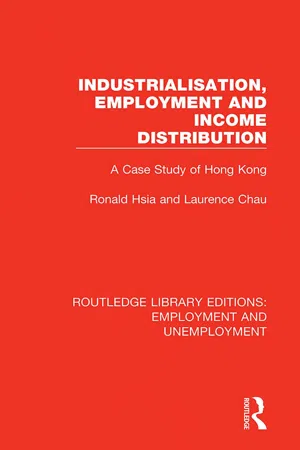
Industrialisation, Employment and Income Distribution
A Case Study of Hong Kong
- 204 pages
- English
- ePUB (mobile friendly)
- Available on iOS & Android
Industrialisation, Employment and Income Distribution
A Case Study of Hong Kong
About This Book
First published in 1978. In spite of the wide recognition of Hong Kong's successful growth record, little is known about the impact that rapid industrialisation has had on income distribution. The transformation of an entrepôt economy into an industrial one has been accompanied by a transition from a labour surplus to a labour shortage economy, which has had a profound influence on the distribution of income by size.
The effect has been channelled through a number of variables such as the composition of employment by industry, occupational structure, labour force participation rate and wage structure. All these changes have, moreover, owed much to the existence of a market mechanism which has been virtually free from government intervention.
Beginning with a comprehensive evaluation of the effects of the various characteristics of employment and the labour force on household income distribution, this study assesses the impact of Hong Kong's industrialisation and employment growth on its income distribution. Through an analysis of the changes in industrial and occupational structures, employment status, household size, labour participation rate, inflow of labour and wage and employment structures, it considers not only how income distribution alters with economic development, but also the mechanism that has brought about these changes.
The redistribution effect of government activities is examined and the incidence of particular taxes to different income groups is apportioned to give a clear overall picture. Finally, the benefits obtained from government expenditures on housing, education and health are measured and are allocated to different income groups, illustrating how this has appreciably reduced income inequality in Hong Kong.
Frequently asked questions
Table of contents
- Cover
- Half Title
- Title Page
- Copyright Page
- Original Title Page
- Original Copyright Page
- Contents
- Acknowledgements
- Preface
- 1. Introduction
- Part One
- Part Two
- Part Three
- Summary and Conclusions
- Appendix A Data and Measurements
- Appendix B Irregular Income and Income in Kind
- References
- Index